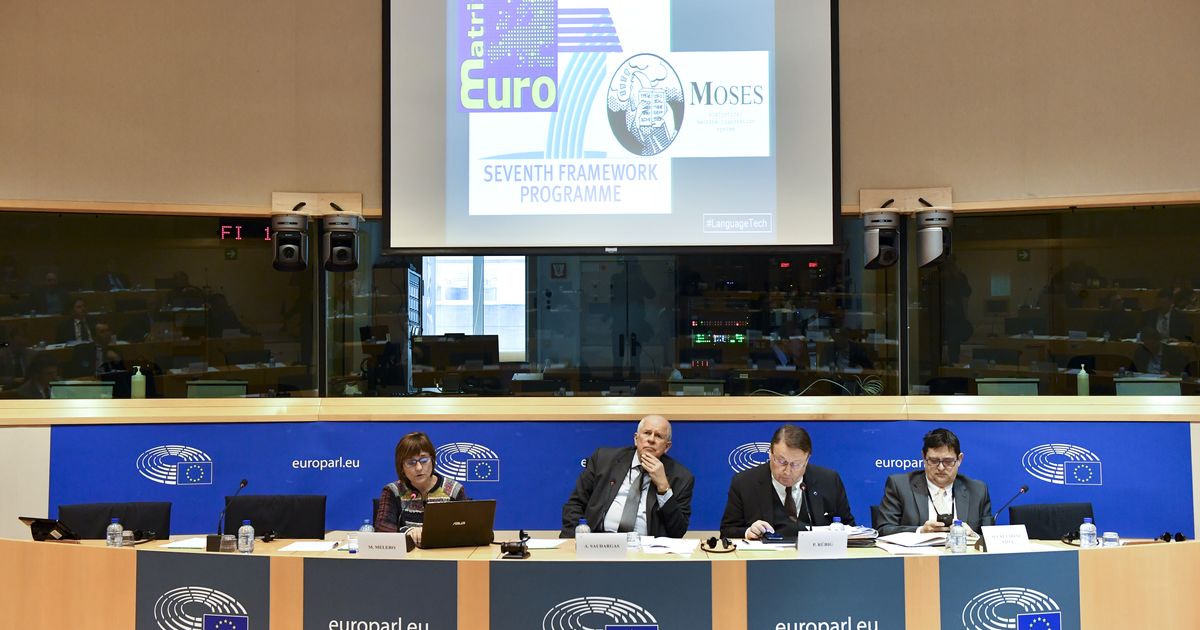
FUEN at European Parliament meeting on language equality in the digital age
16.01.2017On Tuesday January 10, the FUEN attended a meeting in the European Parliament. The meeting focused on how language technologies can be used to overcome the challenges and create opportunities in Europe within the field of multilingualism and linguistic diversity.
Research from different fields sketches the fast development in language technology, automated translation, speech recognition and how it can help overcome language barriers between the different language communities in Europe.
The development of the internet and new media have created a “second Gutenberg-effect”, Andrejs Vasiljevs said. It affected an enormous boost in the availability of information and communication, similar to the invention of the press in the 15th century. Much of this information, however, is only available in large hegemonic languages such as English.
Smaller languages run a risk of digital extinction, since the amount of content available is significantly smaller. A consequence of this, is that larger languages nedd to be utilised in order to access information. If a smaller language is not regularly used, or if used less within specific domains, it will run the risk of extinction. This has important social and political implications. According to a Eurobarometer survey, 46% of all Europeans only speak their mother tongue, and 62% of all European do not speak English well enough to hold a conversation. These people run the risk of being excluded and therefore social justice is endangered.
Language technologies could be a solution to overcome this exclusion, and also to give a boost to the digital single market in Europe; making it easier to do business between different language communities. According to Georg Rehm of META-NET, the availability of speech recognition, text analytics, and machine translation data is only easily accessible for English speakers. For French-, Spanish-, German-, and some other larger European language speakers, the situation for this kind of data access is mostly moderate, while the access to such data is fragmentary or even weak for all other languages spoken in Europe. Most languages, including the smaller state languages and minority languages are facing digital extinction if nothing is done.
Most language technology solutions require serious investments, e.g. self-learning technologies need large databases of language data before they can reach the quality that is needed to become an alternative for human translation. A positive progress however is, that technologies can be shared across languages. For that, long-time programmes are needed to allow scientists to do fundamental research on language technologies. This was the main message that the researchers wanted to give to the Members of the European Parliament.
The meeting was organised by the Society and Technology Options Assessment committee of the European Parliament. The STOA provides committees and other parliamentary bodies with independent, high-quality and scientifically impartial studies and information. They form a basis on which the impact of introducing or promoting new technologies should be assessed. Furthermore, the STOA identifies the ideal options for the best courses of action and organises forums in which politicians, representatives of scientific communities and of society as a whole discuss and compare scientific and technological developments that are politically relevant to civil society.

Basın bildirileri
- FUEN wishes you a peaceful Christmas season, restful days and a bright, hopeful start to the new year!
- FUEN calls on the EU to act over systematic ethnic-based land confiscations in Slovakia
- Women of Minorities conference in Budapest calls for structural change to ensure equal political participation of minority women
- FUEN Başkanı Olivia Schubert Cenevre'deki BM-Azınlık Sorunları Forumu'nda
- Slav Azınlığı'nın 28. Semineri ''Barış Labaratuvarı'' Avrupa Kültür Başkenti Gorizia'da Gerçekleşti
- Equality in Political Participation and Representation: Third “Women of Minorities” Conference to Be Held in Budapest
- FUEN Çalışma Topluluğu Avrupa'daki Azınlık Dersleriyle Karşılaşılan Sorunları ve Geleceğe Matuf Görüşleri Müzakere Ediyor
- 28th Seminar of Slavic Minorities in Europe to take place in Gorica/Gorizia, Italy
- Olivia Schubert FUEN Başkanı Olarak ilk Röportajını Yaptı
- FUEN-Delegeler Meclisi Yeni Liderlik Makamını Seçti – Olivia Schubert Yeni Başkan Seçildi














